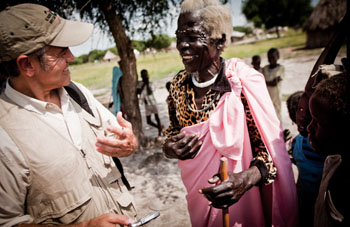
This post originally appeared on Think Progress' blog, The Wonk Room.
“It doesn’t matter what I believe” about the likelihood genocide will take place in South Sudan, said George Clooney on the Today show last week. “Obviously, I’m an actor.” Clooney continued, “The Secretary of State said it’s a ‘ticking time bomb.’ The CIA said this is the next genocide if we’re not careful. The president has said as much. Everyone acknowledges that this is what will take place if someone doesn’t moderate, doesn’t mediate.”
Clooney seems to be keen to tell U.S. officials what they say they know but have, until recently, done surprisingly little to address. Clooney’s visit last week to southern Sudan alongside my boss, the Enough Project’s John Prendergast, has helped generate more attention to Sudan this week than, arguably, the U.S. has paid to the war-torn country since the gravest days of the Darfur conflict. “If you had had the opportunity three months ahead of time to prevent Darfur’s genocide, what would you have done?” they wrote in a Washington Post op-ed yesterday.
Next January — less than 90 days from now — the people of southern Sudan will vote in a referendum on whether to stay unified with the North or break away and form Africa’s newest country. It’s a choice that the ruling parties in the North and South agreed to in 2005 when they signed a peace deal that ended two decades of civil war in which 2 million people died. Southerners are expected to overwhelmingly vote for independence, taking with them large swaths of Sudan’s oil-rich territory. With so much at stake, many worry that war is brewing and will be set off by the momentous vote, or by obstacles that prevent it from taking place on time or at all.
Days before Clooney landed in the southern capital of Juba, President Obama made his most public commitment to Sudan since moving into the White House. At a gathering at the U.N. General Assembly, Obama delivered a 15-minute speech about Sudan, in which he promised to work closely with North and South to fully implement the 2005 Comprehensive Peace Agreement, hold spoilers accountable, whether they disrupt peace talks in Darfur or mettle with the southern referendum, and help develop the South so that it can provide for its citizens. He also noted the importance for the northern ruling party to follow through on its recent pledges to address security concerns and humanitarian access in Darfur.
Clooney’s advocacy blitz this week, which included meetings with Obama, Speaker Pelosi, Senators Lugar and Kerry, and over a dozen media appearances, is helping build the public support to hold Obama to those promises. Over 25,000 people have already sent letters to the president via SudanActionNow.org calling on him to “do everything you can” to prevent a return to war in Sudan. And the numbers are growing quickly.
During his speech at the United Nations, President Obama touted the increased U.S. diplomatic presence in the South, which has, slowly, been rolled out over the past several months. The U.S. government doubled its diplomatic presence in southern Sudan and now has the largest contingent there of any single country. Most notably, among the ranks is former Ambassador Princeton Lyman, whose long legacy in Africa earned him a role as a lead U.S. negotiator tasked with addressing the laundry list of contentious outstanding issues between the two sides. Deadlock over one particularly contentious area — Abyei, located on the North-South border — illustrates how challenging it will be to find common ground between northern and southern parties even with an infusion of U.S. attention and funds.
Almost a year to the day after the Obama administration unveiled its long-awaited Sudan policy — one that promised to adjust pressures and incentives toward the ruling parties of Sudan according to demonstrated progress or backsliding — it appears President Obama and his top officials are beginning to roll it out. Obama’s remarks at the U.N. were full of the “tough love” messaging that is a hallmark of his administration. He was unequivocal about where the responsibility for a smooth referendum lies:
We are here because the leaders of Sudan face a choice. It’s not the choice of how to move forward to give the people of Sudan the peace they deserve. We already know what needs to be done. The choice is for Sudanese leaders — whether they will have the courage to walk the path. And the decision cannot be delayed any longer.
The president’s personal involvement is encouraging. The hour is late, but there’s still time. The urgency that has seized his administration must be sustained to ensure that the will of the southern Sudanese people is respected and that Africa’s newest country — if that’s what the people choose — can emerge without provoking more war.

